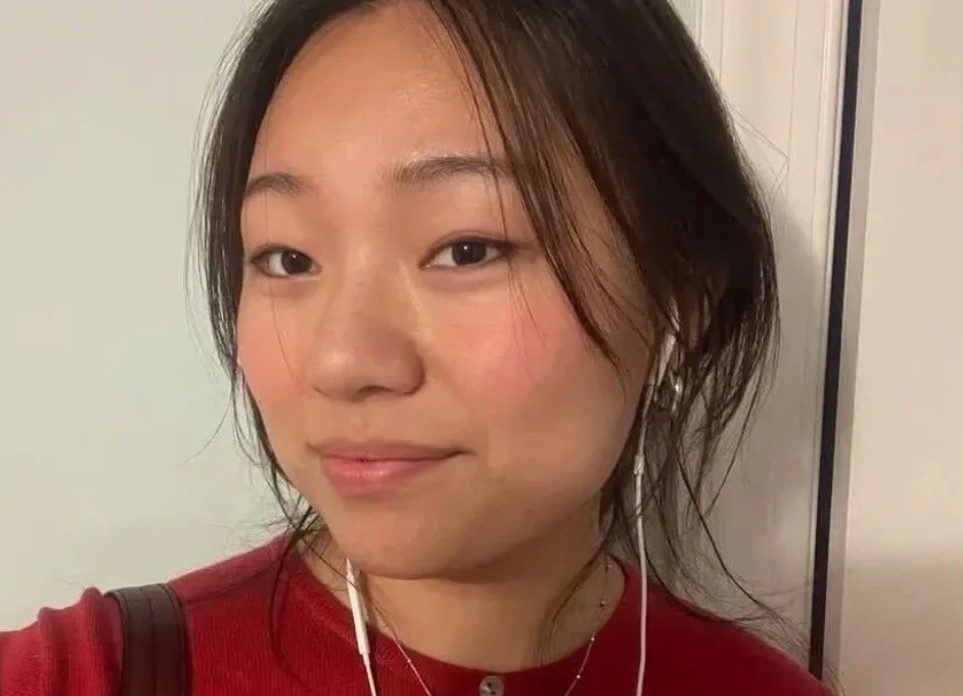YUNSEO CHUNG DEPORTATION

Yunseo-Chung has ended her academ;ic life in the USA and probably internationally as now news goes on the Internet and it's game over!
COLUMBIA UNIVERSITY STUDENT RUINS HER ACADEMIC CAREER
BY CHEERING ON AND PROTESTING FOR PRO PALESTINE TERRORISTS
BY SNN.BZ STAFF
The Cost of Anti-American Activism: Yunseo Chung’s Fall from Academic Grace
In a sobering turn of events, Yunseo Chung, a 21-year-old student from Columbia University, has found herself at the center of a national controversy following her participation in anti-American marches and protests. What began as an expression of political dissent has escalated into an irreversible set of consequences that will alter her life in ways she never anticipated.
The young woman, once an aspiring academic, now faces the ultimate consequence of her actions: deportation from the United States. But this isn’t just about the loss of her visa status. It’s about the irreversible damage to her reputation, her academic career, and her future. Her parents thought that their daughter being a permanent resident would save her – IT DID NOT. Marco Rubio revoked her permanent resident status as well.

A Foolish Path to Deportation
Chung’s downfall started innocuously enough with her involvement in public protests. As a student in the U.S., she had the legal right to express her opinions. However, her anti-American rhetoric went beyond peaceful protests to a point where her actions and statements became increasingly inflammatory. She openly criticized the United States, even engaging in marches that advocated for the overthrow of governmental policies and institutions. It’s worth noting that while citizens of the U.S. enjoy a protected right to free speech, this young woman, a foreign national, overlooked one critical detail: her actions could—and did—jeopardize her right to remain in the country.
After multiple run-ins with university officials and governmental authorities, it became clear that Chung’s actions were not just reckless but detrimental to her future in the U.S. As a non-citizen, she was bound by the terms of her student visa, which strictly prohibits conduct that undermines the peace or sovereignty of the United States. Her continued participation in such disruptive activities led to a deportation order—a harsh and irreversible punishment for her poor judgment.

The Inconvenience of Losing It All
For many students, the allure of studying in the United States is undeniable. World-class institutions like Columbia University offer the promise of academic growth, career opportunities, and personal development. For Chung, however, her tenure at this prestigious institution has been abruptly cut short. The deportation order means that her dream of earning a degree from one of the world’s top universities is effectively over.
This is not just a temporary setback. Chung’s expulsion from Columbia University leaves her with an academic record marred by controversy. Her reputation is tarnished—not just in the U.S. but internationally.
Potential employers, graduate schools, and colleagues will now associate her with this stain on her academic career. Many may view her not as a passionate political activist, but as someone who jeopardized their future for the sake of misplaced ideological fervor.
More than that, Chung faces the challenge of attempting to restart her academic journey from scratch in her home country, should she choose to return there. The scars of this public fallout will not be easily erased. Her actions will follow her wherever she goes, and as someone who once held promise, she will be remembered not for her intellect but for her divisive political stance.
When she speaks of the American government and its leaders, she speaks with contempt and sarcasm. Even those who supported her a few years ago now feel that she’s become too arrogant, entitled and carries a smirk on her face at all times.
Lawsuits Won’t Save You
It’s important to note that many young individuals, particularly those like Chung who have become infamous for their controversial political stances, might believe that filing a lawsuit against the President of the United States or the government could reverse a deportation order. But the reality is far more complicated. The legal system is not as easily manipulated as some would hope.
While the United States Constitution affords protections to citizens, non-citizens—including foreign students—are bound by the rules and regulations that govern their visa status. Deportation for misconduct or violation of visa terms is not a matter of personal opinion or a simple legal battle that can be won in court. Chung’s involvement in anti-government protests was more than just an expression of her political beliefs; it was a direct violation of the terms of her stay. The legal system is unlikely to support someone whose actions are deemed to have jeopardized national security or public order, regardless of their political ideology.
In the end, the reality is that no lawsuit will stop a deportation order when the person involved has actively and demonstrably undermined the values of the country that granted them the opportunity to study, live, and grow.
The Hard Lessons for Future Students
Yunseo Chung’s story is a cautionary tale for foreign students studying in the U.S. Political activism is not inherently wrong, but foreign nationals must understand that their right to protest is not unlimited. When you are in a foreign country, especially one that has granted you the privilege of education, you must be aware of the line between personal expression and behavior that could endanger your future in that country.
For students considering activism or dissent, the most important lesson is that personal opinions and political behavior must be kept in check to avoid damaging your academic career. If you feel strongly about political issues, it is important to consider the broader consequences of your actions.
In the case of Yunseo Chung, her misguided protests not only cost her a degree from a world-renowned institution but also tainted her reputation permanently. What may seem like an empowering act in the moment can lead to a lifetime of regret.
Students who come to the U.S. from abroad should remember that they are here as guests.
Unlike American citizens, who are afforded certain protections under the First Amendment, foreign nationals are subject to the laws of the country they reside in. If you choose to engage in anti-government behavior, consider how it would be received in your home country. Would the same actions be tolerated there? More often than not, the consequences would be far more severe, including imprisonment or loss of fundamental rights.
Conclusion: A Zero, Not a Hero
For Yunseo Chung, the future now looks bleak. The protests, the lawsuits, the media attention—none of it will be enough to undo the damage she has done to her academic life and personal future. She is no hero for standing up against the government; rather, she has become a cautionary figure. The ultimate cost of her actions is a life altered irreparably by her disregard for the system that allowed her to study here in the first place.
To other students considering similar behavior, think carefully about the risks you are taking. Protect your academic career, and above all, remember that while your political beliefs are your own, there are consequences when you choose to challenge the very system that grants you the opportunity to learn and grow.
Having lived in the United States since she was a child and having earned a permanent resident status had no value when ICE and the Department of Justice took a look at Yunseo Chung’s immaturity and sense of entitlement.
Yunseo Chung will have to promote and cheer on terrorists in Korea not the USA.





 Afrikaans
Afrikaans Albanian
Albanian Amharic
Amharic Arabic
Arabic Armenian
Armenian Azerbaijani
Azerbaijani Basque
Basque Belarusian
Belarusian Bengali
Bengali Bosnian
Bosnian Bulgarian
Bulgarian Catalan
Catalan Cebuano
Cebuano Chinese (Simplified)
Chinese (Simplified) Chinese (Traditional)
Chinese (Traditional) Corsican
Corsican Croatian
Croatian Czech
Czech Danish
Danish Dutch
Dutch Esperanto
Esperanto Estonian
Estonian Filipino
Filipino Finnish
Finnish French
French Frisian
Frisian Galician
Galician Georgian
Georgian German
German Greek
Greek Gujarati
Gujarati Haitian Creole
Haitian Creole Hausa
Hausa Hawaiian
Hawaiian Hebrew
Hebrew Hindi
Hindi Hmong
Hmong Hungarian
Hungarian Icelandic
Icelandic Indonesian
Indonesian Irish
Irish Italian
Italian Japanese
Japanese Javanese
Javanese Kannada
Kannada Kazakh
Kazakh Khmer
Khmer Korean
Korean Kyrgyz
Kyrgyz Lao
Lao Latin
Latin Latvian
Latvian Lithuanian
Lithuanian Luxembourgish
Luxembourgish Macedonian
Macedonian Malagasy
Malagasy Malay
Malay Malayalam
Malayalam Maltese
Maltese Maori
Maori Marathi
Marathi Mongolian
Mongolian Myanmar (Burmese)
Myanmar (Burmese) Nepali
Nepali Norwegian
Norwegian Pashto
Pashto Persian
Persian Polish
Polish Portuguese
Portuguese Punjabi
Punjabi Romanian
Romanian Russian
Russian Samoan
Samoan Scottish Gaelic
Scottish Gaelic Serbian
Serbian Sesotho
Sesotho Shona
Shona Sindhi
Sindhi Sinhala
Sinhala Slovak
Slovak Slovenian
Slovenian Somali
Somali Spanish
Spanish Sundanese
Sundanese Swahili
Swahili Swedish
Swedish Tajik
Tajik Tamil
Tamil Telugu
Telugu Thai
Thai Turkish
Turkish Ukrainian
Ukrainian Urdu
Urdu Uzbek
Uzbek Vietnamese
Vietnamese Welsh
Welsh Yiddish
Yiddish Yoruba
Yoruba Zulu
Zulu